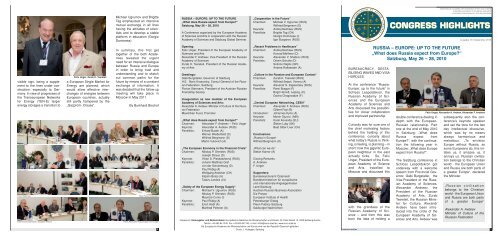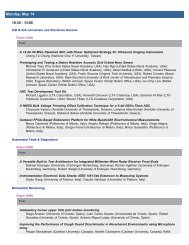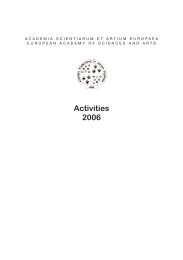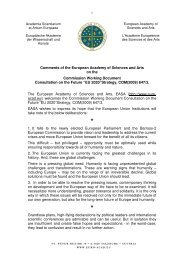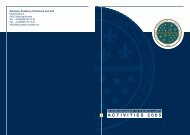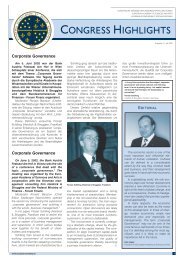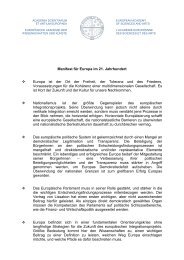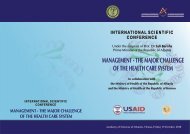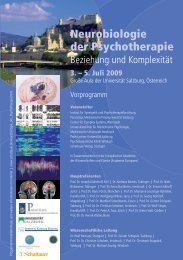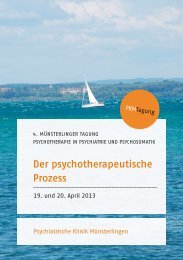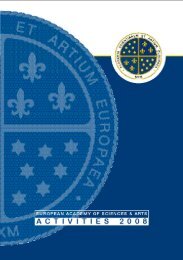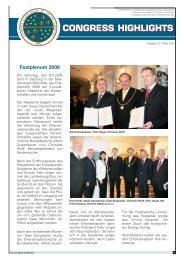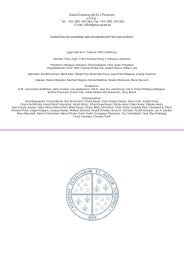CONGRESS HIGHLIGHTS - European Academy of Sciences and Arts
CONGRESS HIGHLIGHTS - European Academy of Sciences and Arts
CONGRESS HIGHLIGHTS - European Academy of Sciences and Arts
You also want an ePaper? Increase the reach of your titles
YUMPU automatically turns print PDFs into web optimized ePapers that Google loves.
visible sign, being a supplement<br />
to the lines under construction,<br />
especially to Germany.<br />
In view <strong>of</strong> progresses <strong>of</strong><br />
the Transeuropean Networks<br />
for Energy (TEN-E) larger<br />
energy storages a transition to<br />
Panel Energy<br />
Panel Culture<br />
Panel Healthcare<br />
Panel Central <strong>and</strong> Eastern <strong>European</strong> Network<br />
Felix Unger, Zurab K. Tsereteli<br />
a <strong>European</strong> Single Market for<br />
Energy are planned, which<br />
would allow effective interchanges<br />
<strong>of</strong> energies between<br />
<strong>European</strong> countries, actually<br />
still partly hampered by the<br />
„Gazprom- Clause“.<br />
Michael Ugrumov <strong>and</strong> Brigitte<br />
Tag emphasized an intensive<br />
mutual exchange in all lines<br />
having the attitudes <strong>of</strong> scientists<br />
<strong>and</strong> to develop a stable<br />
platform in education (Gorgio<br />
Dominese).<br />
In summary, this first get<br />
together <strong>of</strong> the both Academies<br />
revealed the urgent<br />
need for an intensive dialogue<br />
between Russia <strong>and</strong> Europe<br />
in order to bring trust <strong>and</strong><br />
underst<strong>and</strong>ing <strong>and</strong> to sketch<br />
out common paths for the<br />
future by means <strong>of</strong> a constant<br />
exchange <strong>of</strong> information. It<br />
was decided that the follow-up<br />
meeting will take place in<br />
Moscow in May 2011.<br />
By Burkhard Bisch<strong>of</strong><br />
Panel Conclusions<br />
Panel Economy<br />
Panel Future Cooperation<br />
Panel „What does Russia expect from Europe“<br />
5<br />
RUSSIA – EUROPE: UP TO THE FUTURE<br />
„What does Russia expect from Europe?“<br />
Salzburg, May 26 – 28, 2010<br />
A Conference organized by the <strong>European</strong> <strong>Academy</strong><br />
<strong>of</strong> <strong>Sciences</strong> <strong>and</strong> <strong>Arts</strong> in cooperation with the Russian<br />
<strong>Academy</strong> <strong>of</strong> <strong>Sciences</strong> <strong>and</strong> Salzburg Global Seminar.<br />
Opening:<br />
Felix Unger, President <strong>of</strong> the <strong>European</strong> <strong>Academy</strong> <strong>of</strong><br />
<strong>Sciences</strong> <strong>and</strong> <strong>Arts</strong><br />
Alex<strong>and</strong>er F. Andreev, Vice-President <strong>of</strong> the Russian<br />
<strong>Academy</strong> <strong>of</strong> <strong>Sciences</strong><br />
Zurab K. Tsereteli, President <strong>of</strong> the Russian <strong>Academy</strong><br />
<strong>of</strong> <strong>Arts</strong><br />
Greetings:<br />
Gabi Burgstaller, Governor <strong>of</strong> Salzburg<br />
H.E. Boris Krasovsky, Consul General <strong>of</strong> the Russian<br />
Federation, Salzburg<br />
Florian Stermann, President <strong>of</strong> the Austrian-Russian<br />
Friendship Society<br />
Inauguration as new member <strong>of</strong> the <strong>European</strong><br />
<strong>Academy</strong> <strong>of</strong> <strong>Sciences</strong> <strong>and</strong> <strong>Arts</strong>:<br />
Alex<strong>and</strong>er A. Avdeev, Minister <strong>of</strong> Culture <strong>of</strong> the Russian<br />
Federation<br />
Maximilian Fussl, Promoter<br />
„What does Russia expect from Europe?”<br />
Chairmen: Alex<strong>and</strong>er F. Andreev – Felix Unger<br />
Keynote: Alex<strong>and</strong>er A. Avdeev (RUS)<br />
Panellists: Erhard Busek (A)<br />
Werner Weidenfeld (D)<br />
Wilfried Bergmann (D)<br />
Martin Vukovich (A)<br />
„The <strong>European</strong> Economy in the Financial Crisis”<br />
Chairmen: Nikolay P. Shmelev (RUS)<br />
Joseph Straus (D)<br />
Keynote: Viktor S. Pleskatshevsij (RUS)<br />
Panellists: Johann-Matthias Graf<br />
von der Schulenburg (D)<br />
Paul Rübig (A)<br />
Wolfgang Astecker (CH)<br />
Katalin Botos (H)<br />
Talavs Jundzis (LV)<br />
„Safety <strong>of</strong> the <strong>European</strong> Energy Supply“<br />
Chairmen: Michael V. Ugrumov (RUS)<br />
Nikolay P. Shmelev (RUS)<br />
Maurizio Cumo (I)<br />
Keynote: Paul Rübig (A)<br />
Panellists: Erich Hödl (A)<br />
Manfred Perterer (A)<br />
„Cooperation in the Future“<br />
Chairmen: Michael V. Ugrumov (RUS)<br />
Wilfried Bergmann (D)<br />
Keynote: Andrej Nechaev (RUS)<br />
Panellists: Brigitte Tag (CH)<br />
Giorgio Dominese (I)<br />
Igor Burganov (RUS)<br />
„Recent Problems in Healthcare”<br />
Chairmen: Andrej Nechaev (RUS)<br />
Konrad Meßmer (D)<br />
Keynote: Alex<strong>and</strong>er V. Shabrov (RUS)<br />
Panelists: Ortwin Schulte (D)<br />
Sotirios Raptis (GR)<br />
Andrea Raffaseder (A)<br />
„Culture in the Russian <strong>and</strong> <strong>European</strong> Context“<br />
Chairmen: Zurab K. Tsereteli (RUS)<br />
Wilfried Seipel, Vienna (A)<br />
Keynote: Alex<strong>and</strong>r S. Zapesotsky (RUS)<br />
Panellists: Remi Brague (F)<br />
Birgit Harreß, Leipzig, (D)<br />
Gocha Chogovadze (F)<br />
„Central <strong>European</strong> Networking, CEEN”<br />
Chairmen: Alex<strong>and</strong>er F. Andreev (RUS)<br />
Gilbert Fayl (B)<br />
Introduction: Johannes Kyrle (A)<br />
Keynote: Momir Djurovi (MN)<br />
Panellists: Karel Kov<strong>and</strong>a (EU)<br />
Štefan Luby (SK)<br />
Beat Sitter-Liver (CH)<br />
Conclusions:<br />
„Russia in Europe“<br />
Wilfried Bergmann (D)<br />
„What can we do“<br />
Stefan Karner (A)<br />
Closing Remarks:<br />
A. Andreev<br />
F. Unger<br />
Supporters:<br />
Bundeskanzleramt Österreich<br />
Bundesministerium für europäische<br />
und internationale Angelegenheiten<br />
L<strong>and</strong> Salzburg<br />
Austrian-Russian Business Association<br />
Die Presse<br />
<strong>European</strong> Institute <strong>of</strong> Health<br />
Petersburger Dialog<br />
Pleon Publico Salzburg<br />
Salzburger Nachrichten<br />
Impressum: Herausgeber und Medieninhaber: Europäische Akademie der Wissenschaften und Künste, St.-Peter-Bezirk 10, 5020 Salzburg/Austria<br />
Telefon +43-662-841345, Fax +43-662-841343, e-mail: <strong>of</strong>fice@euro-acad.eu, www.euro-acad.eu<br />
Die Europäische Akademie der Wissenschaften und Künste wird von der Republik Österreich gefördert.<br />
Druck: J. Huttegger, Salzburg<br />
BUREAUCRACY, DESTA-<br />
BILISING WAVES AND VISA<br />
HURDLES<br />
At the conference “Russia-<br />
Europe: up to the future” in<br />
Schloss Leopoldskron, the<br />
Russian <strong>Academy</strong> <strong>of</strong> <strong>Sciences</strong><br />
<strong>and</strong> the <strong>European</strong><br />
<strong>Academy</strong> <strong>of</strong> <strong>Sciences</strong> <strong>and</strong><br />
<strong>Arts</strong> discussed the possibilities<br />
for closer collaboration<br />
<strong>and</strong> improved partnership.<br />
Curiosity was for sure one <strong>of</strong><br />
the chief motivating factors<br />
behind the holding <strong>of</strong> this<br />
conference: curiosity about<br />
what today’s Russia is thinking,<br />
is feeling, is planning – in<br />
short: how this gigantic <strong>European</strong><br />
neighbour in the east<br />
actually ticks. So, Felix<br />
Unger, President <strong>of</strong> the <strong>European</strong><br />
<strong>Academy</strong> <strong>of</strong> Science<br />
<strong>and</strong> <strong>Arts</strong>, travelled to<br />
Moscow <strong>and</strong> discussed this<br />
with the gr<strong>and</strong>ees <strong>of</strong> the<br />
Russian <strong>Academy</strong> <strong>of</strong> Science<br />
– <strong>and</strong> from this was<br />
born the idea <strong>of</strong> holding a<br />
www.euro.acad.eu<br />
double conference dealing in<br />
depth with the <strong>European</strong>-<br />
Russian relationship. Part<br />
one at the end <strong>of</strong> May 2010<br />
in Salzburg: „What does<br />
Russia expect from<br />
Europe?“, with the continuation<br />
the following year in<br />
Moscow: „What does Europe<br />
expect from Russia?“.<br />
The Salzburg conference in<br />
Schloss Leopoldskron got<br />
underway with a welcome<br />
speech from Provincial Governor,<br />
Gabi Burgstaller, the<br />
Vice-President <strong>of</strong> the Russian<br />
<strong>Academy</strong> <strong>of</strong> <strong>Sciences</strong>,<br />
Alex<strong>and</strong>er Andreev, the<br />
President <strong>of</strong> the Russian<br />
<strong>Academy</strong> <strong>of</strong> <strong>Arts</strong>, Zurab<br />
Tsereteli, the Russian Minister<br />
for Culture, Alex<strong>and</strong>r<br />
Avdeev have been introduced<br />
into the circle <strong>of</strong> the<br />
<strong>European</strong> <strong>Academy</strong> <strong>of</strong> <strong>Sciences</strong><br />
<strong>and</strong> <strong>Arts</strong>. Avdeev was<br />
EUROPÄISCHE AKADEMIE DER WISSENSCHAFTEN UND KÜNSTE<br />
EUROPEAN ACADEMY OF SCIENCES AND ARTS<br />
ACADEMIA SCIENTIARUM ET ARTIUM EUROPAEA<br />
<strong>CONGRESS</strong> <strong>HIGHLIGHTS</strong><br />
RUSSIA – EUROPE: UP TO THE FUTURE<br />
„What does Russia expect from Europe?“<br />
Salzburg, May 26 – 28, 2010<br />
Ausgabe 18 / September 2010<br />
Felix Unger, Alex<strong>and</strong>er A. Avdeev, Alex<strong>and</strong>er F. Andreev<br />
subsequently also the conference’s<br />
keynote speaker<br />
<strong>and</strong> set the tone for the two<br />
day intellectual discourse,<br />
which was by no means<br />
always harmonious <strong>and</strong><br />
melodious. „To envision<br />
Europe without Russia, as<br />
some <strong>European</strong>s do, this irritates<br />
us, it amazes us, it<br />
annoys us. Russian civilisation<br />
belongs to the Christian<br />
world - the <strong>European</strong> Union<br />
<strong>and</strong> Russia are both parts <strong>of</strong><br />
a greater Europe“, declared<br />
the Minister.<br />
„ R u s s i a n c i v i l i s a t i o n<br />
belongs to the Christian<br />
world - the <strong>European</strong> Union<br />
<strong>and</strong> Russia are both parts<br />
<strong>of</strong> a greater Europe“<br />
Alex<strong>and</strong>er A. Avdeev<br />
Minister <strong>of</strong> Culture <strong>of</strong> the<br />
Russian Federation<br />
31
NO INTEREST IN JOINING<br />
THE EU<br />
Indeed Avdeev did not avoid<br />
the fact that there are, <strong>of</strong><br />
course, also differences<br />
between Russians <strong>and</strong><br />
(western) <strong>European</strong>s. He<br />
himself, he recounted, in his<br />
days as a young diplomat<br />
was a member <strong>of</strong> a working<br />
group that the then Soviet<br />
Foreign Minister, Andrej<br />
Gromyko, had organised in<br />
order to elaborate the differences<br />
between east <strong>and</strong><br />
west, above all those with a<br />
basis in history <strong>and</strong> religion,<br />
for example the rivalry<br />
between Rome <strong>and</strong> Byzantium,<br />
the marriage politics <strong>of</strong><br />
the Czars, the late recognition<br />
<strong>of</strong> private property <strong>and</strong><br />
the long adherence to<br />
despotic rule in Russia <strong>and</strong><br />
the complete isolation from<br />
Europe during the decades<br />
<strong>of</strong> Soviet communist rule.<br />
That is now in the past.<br />
Today, according to Avdeev,<br />
Moscow is seeking a close<br />
partnership with Europe with<br />
regard to commerce, legal<br />
<strong>and</strong> security issues <strong>and</strong> culture.<br />
Russia, however, has<br />
no interest whatsoever in<br />
joining the <strong>European</strong> Union.<br />
This is because „Russia is<br />
not prepared to relinquish to<br />
a higher power its sovereignty<br />
<strong>and</strong> its rights <strong>of</strong> control<br />
over the raw materials within<br />
its own borders“. In addition,<br />
Avdeev criticised the marked<br />
increase in bureaucracy<br />
within the EU. Russia also<br />
sees itself confronted with<br />
this problem but „with EU<br />
Wilfried Bergmann, Felix Unger, Alex<strong>and</strong>er A. Avdeev<br />
bureaucracy, Europe is definitely<br />
not providing us with a<br />
good example to follow“.<br />
RUSSIA DOES NOT NEED<br />
ANY MENTORS<br />
At any rate, Western example<br />
setters or mentors are<br />
not particularly well received<br />
in Russia, according to<br />
Alex<strong>and</strong>r Zapesotsky, a University<br />
Pr<strong>of</strong>essor from St<br />
Petersburg. He formulated<br />
Russian criticism <strong>of</strong> the west<br />
in the sharpest terms at the<br />
conference <strong>and</strong> held a whole<br />
catalogue <strong>of</strong> sins under the<br />
noses <strong>of</strong> both the Americans<br />
<strong>and</strong> the <strong>European</strong>s – with<br />
NATO’s eastward expansion<br />
being the biggest sins <strong>of</strong> all.<br />
„This step, perceived as a<br />
humiliation <strong>of</strong> <strong>and</strong> disregard<br />
for Russia, shocked the<br />
Russian public. Since then,<br />
the West has been viewed<br />
as the source <strong>of</strong> lies <strong>and</strong> <strong>of</strong><br />
betrayal, a situation that has<br />
also rendered the development<br />
<strong>of</strong> democracy in Russia<br />
more difficult „. And, “The<br />
West cannot be our mentor.<br />
What we expect from Europe<br />
is recognition <strong>and</strong> respect for<br />
our own Russian traditions<br />
<strong>and</strong> culture“.<br />
Despite all the criticism levelled<br />
at this perceived incorrect<br />
<strong>European</strong> behaviour<br />
towards Russia, Culture Minister<br />
Avdeev sees no alternative<br />
to an increased closing<br />
<strong>of</strong> Russian <strong>and</strong> <strong>European</strong><br />
ranks – in order to be able to<br />
effectively meet the new<br />
dangers <strong>and</strong> challenges that<br />
they both see themselves<br />
confronting: aggressive<br />
nationalism <strong>and</strong> international<br />
terrorism, religious extremism<br />
<strong>and</strong> the imminent proliferation<br />
<strong>of</strong> weapons <strong>of</strong> mass<br />
destruction, unregulated<br />
migratory flows <strong>and</strong> organ-<br />
ised crime operating across<br />
borders <strong>and</strong> drug <strong>and</strong> people<br />
trafficking. „The distinctive<br />
feature <strong>of</strong> these new dangers<br />
is that they cannot be fought<br />
by conventional armies.<br />
These challenges must be<br />
tackled above all with the<br />
engagement <strong>of</strong> civil society<br />
<strong>and</strong> through close cooperation<br />
<strong>of</strong> special services“, recommended<br />
Avdeev. And:<br />
„The better Russia <strong>and</strong> the<br />
EU can work together in this<br />
regard, the less likely it will<br />
be that these mounting<br />
destabilising waves can<br />
reach us“.<br />
The Minister <strong>of</strong> Culture also<br />
placed a very specific<br />
request on the table at<br />
Schloss Leopoldskron: the<br />
abolition <strong>of</strong> the compulsory<br />
visa in the EU for <strong>European</strong><br />
citizens. „It is really an<br />
anachronism that the visa<br />
wall has survived the Berlin<br />
wall. Let us finally pull this<br />
wall down because it is a nuisance<br />
to us all that is hindering<br />
our commercial, cultural<br />
<strong>and</strong> scientific interactions“.<br />
S E E T H E P O S I T I V E<br />
THINGS<br />
The former Austrian vice<br />
chancellor <strong>and</strong> new president<br />
<strong>of</strong> the EU-Russia centre<br />
in Brussels, Erhard Busek,<br />
expressed regret that the<br />
behaviour <strong>of</strong> Russia towards<br />
Europe continues to be dominated<br />
by fear, whereby in<br />
particular, the fear <strong>of</strong> NATO<br />
is deliberately stoked <strong>and</strong> the<br />
demonization <strong>of</strong> the western<br />
alliance is used for political<br />
ends. „Fear is however a bad<br />
companion“. Busek recommended<br />
instead „to see the<br />
positive things, to break with<br />
our imperial traditions <strong>and</strong> for<br />
all sides to come to terms<br />
with the vestiges <strong>of</strong> history.<br />
And in dealings with Russia,<br />
yes, respect is especially<br />
important“, said Busek, confirming<br />
Russian complaints.<br />
„Europe has largely neglected<br />
to afford this respect“.<br />
Martin Vukovich, Austria’s<br />
long-serving ambassador in<br />
Moscow, also believes that<br />
the West has repeatedly disappointed<br />
Russia in the past.<br />
However, for the envisioned<br />
<strong>and</strong> at the end <strong>of</strong> the day<br />
unavoidable modernisation<br />
<strong>of</strong> Russia, Moscow needs<br />
western partners <strong>and</strong> western<br />
capital. Vukovich is convinced<br />
that „Russians are<br />
looking to Europe expectantly<br />
<strong>and</strong> that we can’t afford to<br />
snub them again. Both parties<br />
would pr<strong>of</strong>it from a modernisation<br />
partnership“.<br />
In his contribution to the discussion<br />
held at Schloss Lepoldskron<br />
the influential<br />
Munich political scientist<br />
Werner Weidenfeld talked<br />
about the difficulties <strong>of</strong> the<br />
EU with regard to a common<br />
political approach towards<br />
Russia. His analysis: „Countries<br />
like Germany, France,<br />
Italy or Austria are interested<br />
in increased cooperation<br />
2 4 2<br />
3<br />
www.european-academy.at<br />
Werner Weidenfeld, Wilfried Bergmann<br />
with Russia, countries such<br />
as Spain <strong>and</strong> Portugal are<br />
not interested, whereas<br />
many CEE countries want to<br />
keep the Russians at a distance“.<br />
The outcome <strong>of</strong> this<br />
„lack <strong>of</strong> a common political<br />
language for dealing with<br />
Russia“ is that Russia<br />
prefers to negotiate with individual<br />
EU countries rather<br />
than with the EU as a whole.<br />
This was also confirmed by<br />
Pr<strong>of</strong>essor Wilfried Bergmann<br />
from the „German Academic<br />
Exchange Service“. „There is<br />
a slow-down process underway<br />
in the EU, whereby the<br />
slowest wagon determines<br />
the speed <strong>of</strong> the train, is it<br />
then so surprising when Russia<br />
prefers to negotiate with<br />
individual large EU countries?<br />
The EU is welcomed<br />
as a partner by Russia but it<br />
must say what it actually<br />
wants, clearly <strong>and</strong> with one<br />
voice. This applies in particular<br />
to an „Energy Charter“<br />
which the EU wishes to sign<br />
with Russia but whose coming<br />
into being Bergmann<br />
considers to be very unlikely.<br />
However, according to<br />
Bergmann, it is precisely in<br />
the area <strong>of</strong> energy that Rus-<br />
sia is not just an interested<br />
partner but rather an essential<br />
partner for the <strong>European</strong>s.<br />
„Russia naturally<br />
wants to sell us oil <strong>and</strong> gas,<br />
but the dependency <strong>of</strong><br />
course works both ways“.<br />
Karel Kov<strong>and</strong>a from the<br />
<strong>European</strong> Commission in<br />
Brussels sees the assessment<br />
<strong>of</strong> foreign policy issues<br />
as representing the biggest<br />
difference between the EU<br />
<strong>and</strong> Russia, using as examples<br />
<strong>of</strong> this the recognition <strong>of</strong><br />
Kosovo <strong>and</strong> Russian actions<br />
in Abkhazia <strong>and</strong> South<br />
Ossetia. Kov<strong>and</strong>a is most<br />
concerned by the situation in<br />
the Northern Caucasus. It<br />
must also be in the interests<br />
<strong>of</strong> the <strong>European</strong>s that a lasting<br />
peace be brought to this<br />
area <strong>of</strong> political, religious<br />
<strong>and</strong> ethnic unrest.<br />
P r o f e s s o r A l e x a n d e r<br />
Shabrov, the Rector <strong>of</strong> the<br />
St Petersburg Medical University,<br />
views closer cooperation<br />
between Russia <strong>and</strong><br />
western <strong>European</strong> scientists<br />
that builds on existing<br />
exchange services, as vital.<br />
The establishment <strong>of</strong> medical<br />
st<strong>and</strong>ards is heavily<br />
dependent on available<br />
financial resources, as is<br />
their implementation. On the<br />
whole, scientific exchange in<br />
the medical area is working<br />
splendidly. That said, new<br />
problems, for instance in the<br />
treatment <strong>of</strong> infections <strong>and</strong><br />
in the routine care <strong>of</strong> the<br />
general population, are now<br />
surfacing in Russia. Andrea<br />
Raffaseder however pointed<br />
out individual projects developing<br />
new medical structures<br />
that are working<br />
steadily towards improved<br />
care for the general population.<br />
In a session between representatives<br />
<strong>of</strong> the academies<br />
from the Balkans with the<br />
Russian <strong>Academy</strong>, Dr.<br />
Johannes Kyrle, Secretary<br />
General from the Austrian<br />
Ministry for Foreign Affairs,<br />
pointed out the necessity <strong>of</strong><br />
mutual dialogues. He advocated<br />
looking strongly to the<br />
future to overcome the difficult<br />
past in the Balkans for a<br />
better Europe. The Acade-<br />
mies have the privilege to<br />
foster stimuli for a mutual<br />
cooperation.<br />
A session focussed on economy,<br />
addressing the problems<br />
in financing (Paul<br />
Rübig, MEP). The World<br />
Economy depends at present<br />
<strong>and</strong> also in the future to<br />
a high degree on fossil energy.<br />
The consumption <strong>of</strong> oil is<br />
8 times higher than 60 years<br />
ago <strong>and</strong> gas consumption<br />
has augmented 14 times.<br />
Still 80 per cent <strong>of</strong> world<br />
energy supply comes from<br />
oil, gas <strong>and</strong> coal, 6 per cent<br />
from nuclear energy, but<br />
already 14 per cent from<br />
renewable energies.<br />
In the field <strong>of</strong> energy (Erich<br />
Hödl), Russia seems to be<br />
reluctant to choose the<br />
<strong>European</strong> Union as the partner<br />
for an „Energy Charter“.<br />
Instead Russia looks more<br />
to the individual <strong>and</strong> larger<br />
Member states, like Germany,<br />
France etc., than to<br />
the EU as a political agent<br />
<strong>and</strong> partner. Certainly, the<br />
<strong>European</strong> Union has also<br />
after the Lisbon-Treaty limited<br />
competencies in energy<br />
Erhard Busek, Martin Vukovich<br />
policy, being still mainly<br />
within national competencies,<br />
but since the „Green<br />
Book 2006“ <strong>and</strong> the following<br />
regulations the influence<br />
<strong>of</strong> the EU has augmented<br />
<strong>and</strong> energy policy falls partly<br />
in the field <strong>of</strong> EU-Foreign<br />
Policy. The EU aims at a<br />
regional diversification <strong>of</strong><br />
foreign energy supply for<br />
which the Nabucco-Line is a


